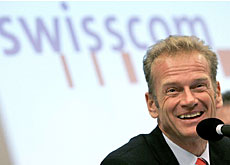Parliament ends “last mile” monopoly

Both chambers of parliament have voted in favour of a further liberalisation of the telecommunications sector, removing Swisscom's "last mile" monopoly.
After a three-year debate, the chambers agreed to a compromise plan opening up to competition the four-year right to connect households to exchanges using copper-cable infrastructure.
Ending Swisscom’s last mile monopoly in itself was not controversial, but the House of Representatives and Senate were divided over just how far down the road of liberalisation Switzerland should go.
The House of Representatives wanted to see liberalisation limited to two years, while the Senate was opposed to any restrictions.
The last mile is Swisscom’s final remaining monopoly. All fixed-line telecoms customers in Switzerland, regardless of their service provider, still have to pay the company a monthly access charge.
Since liberalisation of the Swiss telecoms sector began in 1998, fixed-line prices in particular have dropped significantly.
However, the prices for fixed-line network access have remained largely unchanged for years, with the only real competition coming from television provider Cablecom via its cable network.
Discourage investment?
Swisscom had argued that unrestricted access to this interconnectivity service would discourage major investments in infrastructure.
And fears that liberalisation – and resulting competition – would lead to a “marginalisation” of customers in geographically outlying regions have proved largely unfounded.
Chiara Simoneschi-Cortesi, from the centre-right Christian Democratic Party, said after Tuesday’s debate that it now remained to be seen whether telecom providers were “willed” to provide services in all parts of the country, including peripheral regions.
She said the four-year limit would allow parliament to take stock of their progress.
Georges Theiler of the centre-right Radical Party called the plan a “paper tiger”, saying four years was not enough to motivate telecom companies to make the necessary investments in their infrastructure.
Reaction
There was mixed reaction from Switzerland’s telecoms operators. A Cablecom spokesman said consumers would be the biggest winners from increased competition. Sunrise said the company could finally begin to plan its infrastructure investments.
However a Sunrise spokesman criticised the four-year limit as too short.
The head of Tele 2, Roman Schwarz, hinted that the law would first affect networks in urban areas, where operators could target the largest number of consumers.
But Switzerland’s main consumer organisation said the new law guaranteed full services for all parts of the country.
swissinfo with agencies
The last mile is the final leg of delivering connectivity from a communications provider to a customer.
It is typically seen as an expensive challenge because “fanning out” wires and cables is a considerable physical undertaking.
Swisscom currently has a monopoly on the connections to Switzerland’s four million households and companies.

In compliance with the JTI standards
More: SWI swissinfo.ch certified by the Journalism Trust Initiative



You can find an overview of ongoing debates with our journalists here . Please join us!
If you want to start a conversation about a topic raised in this article or want to report factual errors, email us at english@swissinfo.ch.